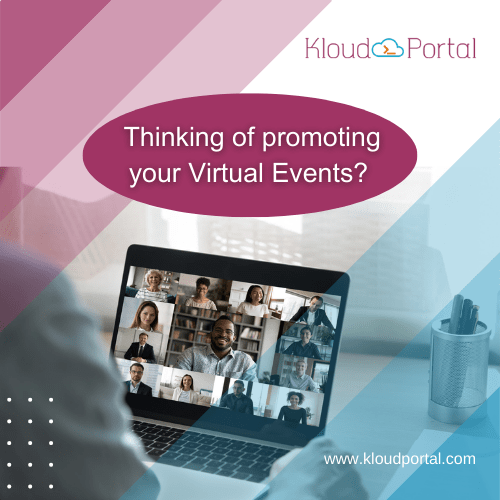Remote and hybrid working are now new ways of working in the post- Covid scenario. This led to a rise in virtual events. Not only those hosted by businesses but also by the entertainment industry, such as interactive concerts in which people across the globe participate.
Virtual event marketing is a strategy that decides the kind of event that will help a business connect with its target audience. It informs its audience about the online event and its details. Virtual event marketing involves collecting and collating data, pursuing leads, measuring event metrics, and fine-tuning tactics for upcoming events.
An online event marketing strategy, incorporating even artificial intelligence if required, should be built around:
- Event landing page
- Email marketing campaigns
- Social media marketing
- Influencer marketing
- Event blog posts
- Event guest posts
- Paid marketing ads
Here are 5 ideas to promote virtual events and ensure they do not end up as just another online event in the digital landscape.
1. Create An Attractive Event Page
Your event page will be the first-place potential participants will head to learn about the virtual event. The event page should stand out and be enticing enough to get people to sign up. Eye-catching images and vibrant colors should mark the event page. And if needed, Machine Learning should be used. Don’t forget to brag about the guest speakers who will attend the event. All information related to the virtual event should be featured on the event page.
Make sure the event page contains:
- The time as well as date of the event and its agenda.
- The speakers at the event, details of event sponsors.
- Links for registration and checkout gateways.
2. Use Keyword Research To Draw Traffic
Those familiar with search engine marketing will know the importance of keyword research. In this case, knowing which keywords potential participants will search to trace your event is crucial from an SEO stance.

There is any number of tools that can be used for keyword planning. Use chat-bots. You can even Google search for appropriate keywords. A degree of imagination and knowledge of the event subject is required. Pepper the marketing content with relevant keywords.
3. Use E-mail Marketing To Your Benefit
Email is an effective marketing tool. And emails continue to be relevant to marketing strategies. Send emails to everybody on the company’s email list. Emails packed with information about virtual events. Send impressive emails, creative ones. Everything connected with the event. Right down to changes related to the event. Don’t forget emails and encourage feedback post the event.
Apart from engaging email content and effective imagery, email marketing strategy for virtual events should use email automation tools such as MailChimp to avoid the likelihood of emails ending up in spam.
4. Build Up Anticipation
To ensure the virtual event does not end up begging for attention and attendance, see to it the build-up given to the virtual event is marked with surprises, including the odd sneak preview. Stay engaged ahead of the virtual event, build anticipation, and regularly share information about the event. Think of it as a movie release. Get the teaser trailer ready. Build hype and get people talking about theevent. Use social media to the fullest to attract attendance. The excitement should be infectious. People should be clamoring for the event to happen. Share footage of the preparations being made for the event. Include short bios of guest speakers. The sneak-peek previews should pique interest in what it will be like on the big day. Use the training engine.
5. Let Social Media Work For You
It’s the age of social media. Promoting events, both physical and virtual, using the reach of social media is the norm these days. Social media ensures information about the planned virtual event is passed on to the relevant audience. Social media is perhaps the most effective and cost-effective marketing tool these days. Sharing information about your virtual event on your company’s social media pages should be the first thing in your virtual event marketing strategy. Also, take advantage of data modeling.
Final Thoughts
Email is the easiest way to publicize a virtual event. Also, the cheapest! Another is website copy. The email, as well as the website copy, should make potential participants feel valued. Also, get onboard experts and influencers to host the event to interest attendees! Optimize the landing pages and use Q&A sessions to engage with the audience. Remember hosting a virtual event does not mean it wouldn’t take time.
A lot of time and resources would have to be invested, and data modeling and pattern building take time. Virtual events are easier to ‘’hold” than physical ones. Also, they enable businesses to access bigger and larger audiences. Thereby helping increase revenues and track important facts about targeted customers. An online event to attract leads and accomplish conversions requires an ideal virtual event marketing strategy.

Arun
About The Author…
Arun has been a print media journalist with wide-ranging experience. In search of solutions to everyday problems, he is drawn to technology and digital marketing. News and analytical insights fascinate him, and he passionately follows all that is new in the tech business. He writes for several news and content platforms. His areas of interest range from digital marketing to blockchain and digital currencies. He is dedicated, focused, and resourceful.




